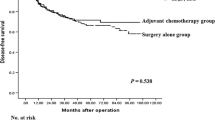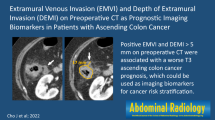Abstract
In current TNM stage system, T4 lesions represent a complex group and should be considered to further optimize the classification. This study evaluates the significance of adhesion pattern in T4 subclassification based on prognostic analysis of T4N0M0 colorectal cancer following en bloc multivisceral resection (MVR). Prospectively collected data (1992–2004) were analyzed for 278 patients with stage T4N0M0 lesions following MVR for colorectal cancer. Patients were divided into inflammatory adhesion (IA) and malignant invasion (MI) groups based on adhesion to adjacent organs. Survival was evaluated by Kaplan–Meier and Cox proportional hazards regression analyses. MI was detected in 249 of 460 (54.1%) resected organs and in 159 of 287 (55.40%) patients undergoing MVR. Compared with IA group, patients in MI group showed no significant difference in clinicopathological data except tumor differentiation (P = 0.0376). Cox proportional hazards regression showed that MI was independently associated with overall survival among both colon (HR = 2.028; P = 0.0001) and rectal (HR = 0.451; P = 0.0002) cancer patients. Kaplan–Meier analysis showed that MI patients had a significantly higher MVR compared with IA patients (colon cancer: P = 0.0018; rectal cancer: P = 0.0116). In conclusion, MI was validated as an adverse prognostic factor for stage T4N0M0 colorectal cancer following MVR suggesting that it may be classified as a T4-subgroup in order to reinforce practice guidelines.

Similar content being viewed by others
References
Jemal, A., Siegel, R., Ward, E., Murray, T., Xu, J., & Thun, M. J. (2007). Cancer statistics, 2007. CA: A Cancer Journal for Clinicians, 57, 43–66.
Otchy, D., Hyman, N. H., Simmang, C., Anthony, T., Buie, W. D., Cataldo, P., et al. (2004). Practice parameters for colon cancer. Diseases of the Colon and Rectum, 47, 1269–1284.
Moriya, Y., Akasu, T., Fujita, S., & Yamamoto, S. (2003). Aggressive surgical treatment for patients with T4 rectal cancer. Colorectal Disease, 5, 427–431.
Lopez, M. J. (2001). Multivisceral resections for colorectal cancer. Journal of Surgical Oncology, 76, 1–5.
Sasson, A. R., & Sigurdson, E. R. (2000). Management of locally advanced rectal cancer. Surgical Oncology, 9, 193–204.
Gebhard, C., Meyer, W., Ruckriegel, S., & Meier, U. (1999). Multivisceral resection of advanced colorectal carcinoma. Langenbeck’s Archives of Surgery, 384, 194–199.
Lopez, M. J., & Monafo, W. W. (1993). Role of extended resection in the initial treatment of locally advanced colorectal carcinoma. Surgery, 113, 365–372.
Poeze, M., Houbiers, J. G., van de Velde, C. J., Wobbes, T., & von Meyenfeldt, M. F. (1995). Radical resection of locally advanced colorectal cancer. British Journal of Surgery, 82, 1386–1390.
Greene, F. L., Page, D. L., Fleming, I. D., Fritz, A. G., & Balch, C. M. (Eds.). (2002). AJCC cancer staging manual (6th ed.). New York: Springer-Verlag.
Sobin, L. H., & Wittekind, C. (Eds.). (2002). International union against cancer TNM classification of malignant tumors (6th ed.). New York: Wiley-Liss.
Nelson, H., Petrelli, N., Carlin, A., Couture, J., Fleshman, J., Guillem, J., et al. (2001). Guidelines 2000 for colon and rectal cancer surgery. Journal of the National Cancer Institute, 93, 583–596.
Lehnert, T., Methner, M., Pollok, A., Schaible, A., Hinz, U., & Herfarth, C. (2002). Multivisceral resection for locally advanced primary colon and rectal cancer: An analysis of prognostic factors in 201 patients. Annals of Surgery, 235, 217–225.
Nakafusa, Y., Tanaka, T., Tanaka, M., Katajima, Y., Sato, S., & Miyazaki, K. (2004). Comparison of multivisceral resection and standard operation for locally advanced colorectal cancer: Analysis of prognostic factors for short-term and long-term outcome. Diseases of the Colon and Rectum, 47, 2055–2063.
Luna-Pérez, P., Rodríguez-Ramírez, S. E., De la Barrera, M. G., Zeferino, M., & Labastida, S. (2002). Multivisceral resection for colon cancer. Journal of Surgical Oncology, 80, 100–104.
Govindarajan, A., Coburn, N. G., Kiss, A., Rabeneck, L., Smith, A. J., & Law, C. H. (2006). Population-based assessment of the surgical management of locally advanced colorectal cancer. Journal of the National Cancer Institute, 98, 1474–1481.
Ferenschild, F. T., Vermaas, M., Verhoef, C., Dwarkasing, R. S., Eggermont, A. M., & de Wilt, J. H. (2009). Abdominosacral resection for locally advanced and recurrent rectal cancer. British Journal of Surgery, 96, 1341–1347.
Sugarbaker, E. D., & Wiley, H. M. (1950). The significance of fixation in operable carcinoma of the large bowel. Surgery, 27, 343–347.
Rowe, V. L., Frost, D. B., & Huang, S. (1997). Extended resection for locally advanced colorectal carcinoma. Annals of Surgical Oncology, 4, 131–136.
Gospodarowicz, M. K., Miller, D., Groome, P. A., Greene, F. L., Logan, P. A., & Sobin, L. H. (2004). The process for continuous improvement of the TNM classification. Cancer, 100, 1–5.
Compton, C. C. (2007). Optimal pathologic staging: Defining stage II disease. Clinical Cancer Research, 13, 6862s–6870s.
Derici, H., Unalp, H. R., Kamer, E., Bozdag, A. D., Tansug, T., Nazli, O., et al. (2008). Multivisceral resections for locally advanced rectal cancer. Colorectal Disease, 10, 453–459.
Croner, R. S., Merkel, S., Papadopoulos, T., Schellerer, V., Hohenberger, W., & Goehl, J. (2009). Multivisceral resection for colon carcinoma. Diseases of the Colon and Rectum, 52, 1381–1386.
Bünte, H. (1982). Syndromes following resection and gastrectomy. Langenbecks Archiv für Chirurgie, 358, 95–100.
Montesani, C., Ribotta, G., De Milito, R., Pronio, A., D’Amato, A., Narilli, P., et al. (1991). Extended resection in the treatment of colorectal cancer. International Journal of Colorectal Disease, 6, 161–164.
Heslov, S. F., & Frost, D. B. (1988). Extended resection for primary colorectal cancer involving adjacent organs or structures. Cancer, 62, 1637–1640.
Reiner, G., Teleky, B., Wunderlich, M., & Schiessel, R. (1987). Extended organ resection of colorectal cancer. Langenbecks Archiv für Chirurgie, 371, 281–290.
Winter, D. C., Walsh, R., Lee, G., Kiely, D., O’Riordain, M. G., & O’Sullivan, G. C. (2007). Local involvement of the urinary bladder in primary colorectal cancer: Outcome with en-bloc resection. Annals of Surgical Oncology, 14, 69–73.
Author information
Authors and Affiliations
Corresponding author
Additional information
Ying-Gang Chen and Yan-Long Liu contributed equally to this study.
Rights and permissions
About this article
Cite this article
Chen, YG., Liu, YL., Jiang, SX. et al. Adhesion Pattern and Prognosis Studies of T4N0M0 Colorectal Cancer Following En Bloc Multivisceral Resection: Evaluation of T4 Subclassification. Cell Biochem Biophys 59, 1–6 (2011). https://doi.org/10.1007/s12013-010-9106-z
Published:
Issue Date:
DOI: https://doi.org/10.1007/s12013-010-9106-z




